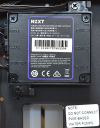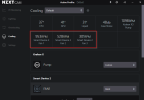askthisthing
Member
Hi everyone,
NZXT's H510i and H510 Elite cases include an Fan & RGB controller, which is named "Smart Device 2" in NZXT CAM.
The device doesn't show up in HWiNFO, even if HWiNFO is started before NZXT CAM.
It features 3x FAN connectors, each connector is individually controllable in NZXT CAM. I don't want to control the fans via HWiNFO (I know it's not in scope), but I would like to monitor their speed RPM.

I've made a search changelog/version history but I haven't found support for this device. Would it be possible to support this?
Thank you & best regards
P.s. the device has been "Designed in Los Angles, California"
NZXT's H510i and H510 Elite cases include an Fan & RGB controller, which is named "Smart Device 2" in NZXT CAM.
The device doesn't show up in HWiNFO, even if HWiNFO is started before NZXT CAM.
It features 3x FAN connectors, each connector is individually controllable in NZXT CAM. I don't want to control the fans via HWiNFO (I know it's not in scope), but I would like to monitor their speed RPM.

I've made a search changelog/version history but I haven't found support for this device. Would it be possible to support this?
Thank you & best regards
P.s. the device has been "Designed in Los Angles, California"

